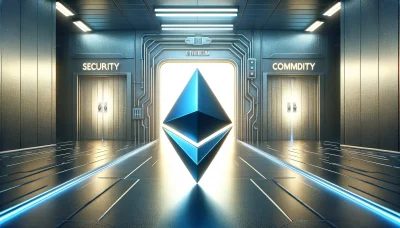SEC Chair Gary Gensler avoids direct classification of Ethereum

Share this article
It appears that the SEC is playing it cool when it comes to classifying Ethereum. In a recent interview, Chair Gary Gensler sidestepped the question of whether Ether is a commodity or security, focusing instead on broader regulatory concerns and investor protection.
Meanwhile, Ether traders are rushing to short the second-largest cryptocurrency in the wake of Grayscale Investments pulling its application for an Ethereum futures ETF. This move comes as speculation about Ether’s potential classification by the SEC as a security spread, bringing uncertainty around the possibility of Ethereum ETFs being rejected altogether.
On the regulatory front, the US Department of Justice has identified and indicted Russian national Dmitry Khoroshev as the mastermind behind the notorious LockBit ransomware gang. The group allegedly carried out attacks worth over $500 million, typically paid in Bitcoin, and the DOJ is now offering a substantial $10 million reward for information leading to his arrest.
Today’s Newsletter
- SEC Chair Gary Gensler avoids direct Ethereum classification
- Traders rush to short Ether as Grayscale withdraws futures ETF plan
- US authorities identify and charge Russian mastermind behind LockBit ransomware group
Markets
|
Data powered by CoinGecko.
|
Top Stories
REGULATION
SEC Chair Gary Gensler avoids direct Ethereum classification
Asked about Ethereum’s legal status, Gensler refrained from providing a definitive answer in a live interview. The SEC chair was hesitant on whether it should be considered a commodity or a security, a crucial question that he’s been dodging for some time now. Instead, he emphasized the SEC’s broader goals of protecting American investors and ensuring compliance with securities trading laws, highlighting the lack of proper disclosures and protections for investors in the current crypto market.
Gensler also addressed the disproportionate media attention on crypto, suggesting that it is driven more by the prevalence of scams, fraud, and regulatory issues in the industry than by the SEC’s own agenda. He noted that while crypto represents a small portion of the financial market, it attracts widespread interest from journalists due to the high concentration of noncompliance and the need for investor protection. [cryptobriefing]
ETHEREUM
Traders rush to short Ether as Grayscale withdraws futures ETF plan
Ether is currently hovering near a key support level at $3,010, having dropped by 1.85% over the past 24 hours. Liquidation maps reveal that traders have more conviction in the price going down in the near term, with $345 million in short positions set to liquidate if the price rises by 3%, compared to only $237 million in long positions that would be wiped out by a 3% drop.
The sentiment among the crypto community is similar, with 92% of participants on the New York-based crypto predictions platform Polymarket believing that spot Ether ETFs will be denied. Glassnode attributes Ether’s underperformance this cycle relative to Bitcoin to a “measurable lag in speculative interest” from the short-term holder cohort, despite some traders’ optimism about a potential breakout by the end of 2024. [cointelegraph]
REGULATION
US authorities identify and charge Russian mastermind behind LockBit ransomware group
Prosecutors allege that Khoroshev developed, promoted, and oversaw the LockBit software, recruiting affiliates on cybercriminal forums who carried out the actual ransomware attacks and gave Khoroshev a 20% cut of their earnings, typically paid in Bitcoin. The indictment states that Khoroshev received $100 million in Bitcoin disbursements from LockBit’s activities over the course of its operation, and US authorities are seeking forfeiture of his ill-gotten gains.
Despite the charges and sanctions, Khoroshev remains at large and, according to a March interview with The Record, continues to operate LockBit. If convicted, he could face a maximum of 185 years in prison for the 26 charges against him, including conspiracy to commit fraud, extortion, wire fraud, intentional damage to protected computers, and extortion in relation to information unlawfully obtained from protected computers. Interestingly, Khoroshev was identified because of his food delivery orders for sushi and Cheesecake Factory. [cryptobriefing]
Other News
Trending News
Vince
Share this article
